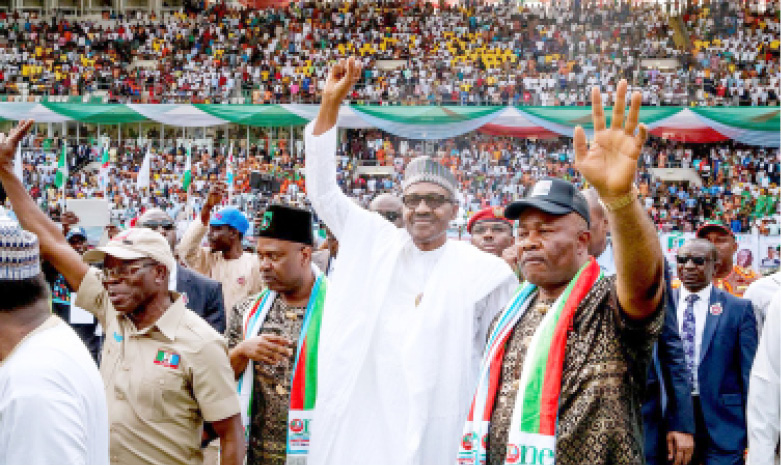Myths about Buhari’s media appearance
In a fitting riposte to the opposition-sponsored propaganda about being incapable of going through a press interview without bungling it, President Muhammadu Buhari decided to face the editors of ThisDay/Arise and show that he was, in fact, quite capable of rationalising his pronouncements and policies, as well as throwing a few humbling posers to rattle […]

From right: Former governor of Akwa Ibom State, Sen. Godswill Akpabio; President Muhammadu Buhari; APC National Chairman, Comrade Adams Oshiomhole (left) and other dignitaries, during the president’s arrival at the Godswill Akpabio Stadium in Uyo, Akwa Ibom State during the flag-off his re-election campaign recently. Photo: State House
In a fitting riposte to the opposition-sponsored propaganda about being incapable of going through a press interview without bungling it, President Muhammadu Buhari decided to face the editors of ThisDay/Arise and show that he was, in fact, quite capable of rationalising his pronouncements and policies, as well as throwing a few humbling posers to rattle the press and other elitist armchair critics.
For one who had been advisedly wary of opening himself to the predatory instincts of an opposition-propelled press, President Buhari had no illusions about the sort of questions he would be asked, just as ThisDay pen-pushers did not spare him from a barrage of questions on the main contentious issues about the Buhari presidency. .
The reassuring resurgence of President Buhari’s media profile through the Thisday interview was underscored by the generally positive reviews it earned to the satisfaction of most Nigerians who were impressed by the president’s articulate response to questions. A high point of the encounter came with the president’s witty insistence on the credibility of his own facts over the statistical figures reeled out by his questioner pertaining to the performance of his administration in the agricultural sector.
After referring to several initiatives of his administration, including fine-tuning the cooperatives model introduced in the old Western Region by the late Obafemi Awolowo, to back his confident assertion that “we have made tremendous progress in agriculture and some of the issues of unemployment have been addressed through agriculture,” the president advised the journalist to conduct more studies on his impact on the sector, otherwise “ there will be a conflict because you have the figures and I have the facts,” implying that figures could be cooked up but facts are stark reality.
President Buhari also calmly took responsibility for some issues that had been swamped in press controversy and criticism, like the retention of service chiefs beyond their tenures and alleged lopsided appointments, and again, confidently rationalised his stance.
On the retention of service chiefs he maintained that disrupting the military hierarchy during emergency situations was riskier than people knew, and relied on the benefit of his rich career experience and deep insight to point out that he had been a governor, minister and head of state. “So really, I measure the options critically. In an emergency situation, if you remove the service chiefs, if you don’t wait for the appropriate time to do it, you will create a competition in the service. You can make your observation, but it will have consequences,” he submitted.
Responding to the top appointments he made, the president remarked, “The Chief of Army Staff is not there because he is from Borno, the Chief of Air Staff is not there because he is from Kano, the Chief of Naval Staff is not there because he is from the South-South. He then recalled, “Someone brought a paper and said I had not been fair to the South-East. I took the paper and told him that when I won the election I studied the votes I scored from all the geo-political zones. I said I got 198,000 and something from the whole of the South-East, which virtually any of the local governments could give me up country, but I took the Minister of Foreign Affairs, the Minister of Labour, the Minister of Industry, Trade and Investment, Minister of Science and Technology from the South-East. I never knew these four from Adam, but from seven states of the North I chose ministers of state who are under such ministers. How fair do you want me to be? So I threw him away with his paper.”
The president deftly deflected much of the long-running criticisms of his style and policies while acknowledging that he couldn’t possibly achieve full success in four years, even in the priority areas, considering the 16-year entrenchment of underlying problems and the drastically depleted national coffers. But he repeatedly carpeted his elitist critics for relentlessly bashing his best efforts and modest achievements thus: “Where were the elite when there was irresponsible expenditure of public money? Why did they tolerate it? Educate the people and see their reaction. Where were the elite then when these people were taking the money? The Nigerian elite are supposed to know how much the country is earning, where it is going. Why did they accommodate irresponsible expenditure of the 16 years of Peoples Democratic Party (PDP)?’’
Dumbfounded or hypocritical, the Nigerian elite became the punching bag of their favourite whipping boy when he boldly chose their exclusive journal to take his crusade against moral and governmental corruption to their loot-littered luxury havens. President Buhari evidently has little regard for those who will not see anything good about his patriotic zeal, and he did not mince words in telling them so when he concluded his ThisDay/Arise interview, saying, “I think more of the ordinary people than the elite feel the impact of my effort.” That is what any good leader looks forward to.
Okemeke, a public affairs analyst, wrote from Port Harcourt, Rivers State.
